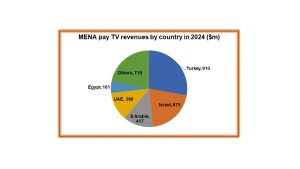
After more than 40 years of operation, DTVE is closing its doors and our website will no longer be updated daily. Thank you for all of your support.
Digital TV Research: MENA pay TV impacted by BeIN dispute
Pay TV revenues have declined in the Middle East and North Africa over the past two years thanks in to piracy, competition from OTT providers, falling revenue per user, and the Saudi-led ban on BeIN Media.
 This according to Digital TV Research’s latest ‘Middle East and North Africa Pay TV Forecasts’ report, which said that pay TV revenues for 20 MENA countries declined 11% to just under US$3 billion (€2.6 billion) between 2016 and 2018.
This according to Digital TV Research’s latest ‘Middle East and North Africa Pay TV Forecasts’ report, which said that pay TV revenues for 20 MENA countries declined 11% to just under US$3 billion (€2.6 billion) between 2016 and 2018.
Pay TV revenues across the region are expected to be lower in 2024 at US$3.28 billion than they were in 2016, when they stood at US$3.36 billion.
In 2024, Turkey and Israel are expected to supply nearly half of the region’s pay TV revenues. However, Israel is expected to lose a tenth of its pay TV subscribers between 2014 to 2024 and a third of its pay TV revenues between 2015 and 2024.
Turkish pay TV revenues are also expected to be in lower 2024 than in 2016, despite the number of pay TV subscribers growing from 7.15 million in 2018 to 9.01 million in 2024.
In the region’s 13 Arab-speaking countries, pay TV revenues fell 16% from US$1.25 billion in 2016 to US$1.06 billion in 2018, but are expected to recover to reach US$1.43 billion by 2024.
Pay TV subscriptions fell by 9.5% between 2016 and 2018 to 3.40 million, but are expected to reach 5.23 million by 2024. BeIN alone lost an estimated 47% of its subscriber base in the two years to the end of 2018 to take its total down to 525,000.
“Pay TV in the MENA region has been hit by a Saudi-led ban on the sale of Qatar-backed BeIN decoders and subscriptions since mid-2017,” said Simon Murray, principal analyst at Digital TV Research.
“The ban has been compounded by BeoutQ, an illegal platform that retransmits some of BeIN’s content especially its exclusive sports rights. The region is no stranger to piracy, but the sophistication of the BeoutQ operation is beyond anything seen before.
“BeIN is fiercely protesting BeoutQ, with the support of major content owners, especially sports federations. We believe that the situation will be resolved in 2019; given the international pressure to drop the ban and to close BeoutQ.”
In November, the BBC and Sky called on the European Commission to take formal action against Saudi Arabia over pirate broadcaster BeoutQ providing illegal access to content including the English Premier League.
Both companies sent letters to Anna Malmström, the EC’s commissioner for trade, adding their voices to calls for a formal EU protest to the Saudi government. It has been alleged that the Saudis are supporting BeoutQ as part of its campaign against neighbouring Qatar.
Last month, the World Trade Organisation agreed to set up a panel to investigate Saudi Arabia’s alleged failure to protect Qatar-based BeIN Media’s intellectual property rights, amid disagreement over whether the WTO could launch a probe in a case that the Saudi government claims to be a matter of national security.
Meanwhile, in past week, BeIN Media set up a ‘reveal all’ website to expose what it described as “the industrial scale theft” of sports and entertainment content. BeIN claims that BeoutQ was launched in Saudi Arabia in August 2017 to illegally broadcast premium sports and entertainment rights.

